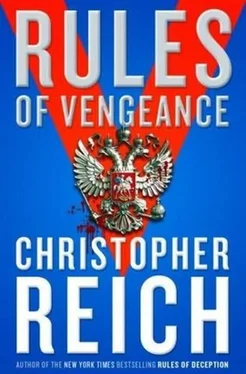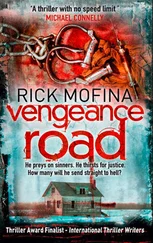“No, this was not an attack on Ivanov,” the president went on. “This was an attack on our country. An attempt to strike while we are weak.”
Shvets thought of the abandoned worksites he’d viewed flying in, the buildings left half finished. He did not refute the comment. The country was in a lamentable condition, and everyone knew it.
For the past ten years the Russian economy had expanded at an average annual rate of 7 percent. Growth was due entirely to the exploitation of its vast natural resources: timber, gold, diamonds, natural gas, and most of all oil. Proven reserves stood at 80 billion barrels-seventh largest in the world-with experts certain that another 100 billion barrels remained to be discovered. Production had increased from 6 million barrels a day in 2001 to 10 million barrels a day in the past year. This increase, along with the stratospheric rise in oil prices over the same time, had resulted in a bonanza of cash. At its peak, Russia was earning well over $1 billion a day from oil exports alone, or over 65 percent of the country’s gross domestic product.
Since then the price of oil had utterly collapsed, and it showed no signs of rebounding. The stock market had shed 80 percent of its value, and foreign direct investment had dried up entirely. Worse still, the ruble was down by half against the dollar in the past three months alone.
The country was in free fall.
“Do you know why I sent Igor Ivanovich to London?” the president asked.
Shvets admitted that he did not.
“I sent him to meet with a consortium of European petroleum companies in the hopes of winning back their confidence so that they might consider investing with us once again. In the past we were arrogant. We did not keep our promises to our business partners. Our demeanor was predatory. We wanted everything for ourselves. It’s no wonder that they fled. I’ll admit it was my fault, but what’s done is done. It was Ivanov who showed me that I was wrong. Without help from the West, we will never be able to bring back oil production to its former level, let alone increase it. With my blessing, he extended an olive branch to the major petroleum producers. It was not a popular decision.”
“Oh?”
“The men who run our domestic oil operations aren’t anxious to cede even one ruble to others. They’ve grown fat and lazy. They’ve lost the ability to separate their own well-being from that of the motherland’s.”
Shvets knew them well.
Before moving into the private sector, all had spent their careers with the KGB. One had served an assignment as station chief in Mozambique. Another had been second secretary at the United Nations. A third had acted as a double agent nestled inside the Russian embassy in Madrid, pretending to be America ’s greatest source. And Shvets had headed Directorate S of the KGB, in charge of clandestine operations, everything from running covert agents abroad to conducting industrial espionage on Russia ’s behalf to planning and executing acts of terror on foreign soil.
They were a brotherhood of spies.
And as such, none was to be trusted.
Shvets knew why the president had posted snipers around his compound.
“Do you believe that one of them had something to do with the attack on Ivanov?” he asked.
“I said no such thing.” But the president’s sour expression conveyed a different message. “Igor Ivanovich is a friend. He is also a patriot, which is more than I can say for the others. You will bring the state’s fullest resources to tracking down and punishing his attackers.”
The president hugged Shvets and kissed his cheeks three times, as was their custom. “And Sergei,” he said, holding the spy at arm’s length. “If, by God, they are Russian, I shall carry out the sentence myself.”
In London, Interior Minister Igor Ivanov lay sleeping in his bed in the intensive care unit of St. Catharine’s Hospital. One IV delivered a glucose drip to his arm. Another administered hourly doses of pentobarbital to keep him in an induced coma. A cuff monitored his blood pressure. Clamps on his fingers measured his blood oxygen. His face-or what was visible of it beneath his bandages-was colored a violent, multihued purple. Gashes on his forehead and cheek had required a total of ninety-nine stitches. He was not a handsome man to begin with. He would be less so upon his discharge, should he survive.
“Do you know who he is?” asked the nurse in charge, a soft-spoken brunette named Anna.
Dr. Andrew Howe, chief of neurology, finished entering the patient’s vital signs on his chart. “Ivanov? Some sort of diplomat, isn’t he?”
“He is a monster.”
“Say again?” asked Howe, taken aback by the vitriol in the woman’s voice.
“At home we call him the Black Devil.”
Howe put down the chart and took a closer look at the nurse’s name tag. Anna Bakareva.
“Where’s home?”
“ Grozny, Chechnya,” she said. “I left many years ago, when I was eleven. But I remember Ivanov. He led the troops who sacked the city.”
Howe was a former military man himself, a surgeon attached to the Royal Scots Guards, and he remembered hearing about the atrocities inflicted by the Russian army during their attack on the Chechen capital in the mid-1990s. It was a grim business.
The nurse had large black eyes that never left Ivanov. “His soldiers came to my neighborhood looking for one of the resistance leaders. When they could not find him, they rounded up all the men from my building and the buildings up and down the street and took them to the soccer stadium. They took old men, young men. It didn’t matter. Seven hundred in all. They took my brother, too. He was ten years old.” She stopped and pointed at Ivanov. “He personally shot every one of them.”
“I’m sorry,” said Howe.
“Will he live?” the nurse inquired in a tone inappropriate for a care-giver.
“Too soon to tell. Not much damage apart from the cuts and bruises. No broken bones. No internal bleeding. It’s the brain I’m worried about. He got knocked around pretty well inside his car.”
Howe knew a few things about cerebral trauma. A few years back, he’d done a tour in Basra, in southern Iraq. Improvised explosive devices, or IEDs, were the most frequent cause of injury. During his time he’d seen over two hundred cases similar to Ivanov. So soon after the initial trauma, it was impossible to make an accurate prognosis. Some patients regained full control of all their faculties. Others persisted in a vegetative state for weeks or months. Others never woke again at all. Most, though, fell in between, suffering some form of lasting impairment, anything from a faulty short-term memory, to loss of their sense of taste and smell, to more serious neurological disorders.
“His MRI came back negative,” said Howe. “When the swelling goes down, we’ll know more.”
The nurse from Chechnya nodded. It was apparent that the news displeased her.
Howe left the room and walked directly to the aid station, where he made sure that Nurse Anna Bakareva would have nothing further to do with the care of Igor Ivanov, the Black Devil. He did not believe that she would do anything expressly to harm him. She might, however, forget to administer a painkiller or inadvertently dose him with the wrong medicine. It was not a risk he was prepared to take.
Hunched in the backseat of Colonel Charles Graves’s Rover, Jonathan watched as the country lanes of Hereford gave way to two-lane roads and the rolling hillocks yielded to asphalt plains. Finally they gained the M4 motorway and made a beeline for London. A police escort led the way lights flashing, siren muted. Another followed, practically riding their bumper. It was after six, but the fierce sun showed no signs of calming. Inside the car, the air conditioner blasted everyone with a torrent of humid, lukewarm air.
Читать дальше












